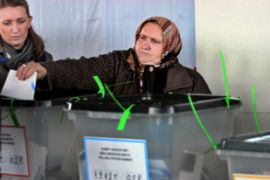Kosovans vote in local elections
Turnout modest in polls that ethnic Albanians hope will lead to independence.

Al Jazeera travelled to the north of the province with the UN to see whether the Serb minority was listening to Belgrade’s calls.
In the village of Vracevo, close to the border with Serbia, there were 969 registered voters but no one had cast a ballot by 11:30am local time.
UN disappointed
Steve Schuck, a retired US army officer who is the deputy head of the UN mission in Kosovo (Unmik), told Al Jazeera that Serbs were being prevented from choosing the institutions that will represent them.
“I am disappointed by all the intimidation and humiliation which is keeping Serbs away from here,” he said.
| In video | ||
|
With independence expected to declared in the near future, Schuck said: “If there has ever been a critical time for Kosovan Serbs to vote, it is now.”
There were no voters in nearby Leshak when the UN team arrived at about midday.
On the eve of the election, the home of a Serbian politician in the north was targeted in a Molotov cocktail attack, Veton Elshani, a police spokesman, said.
“The explosion damaged a car in the garage. We don’t know what is behind the attack,” he said.
Voters suspicious
Overall, turnout was modest among ethnic Albanians too, who have grown suspicious of political parties and unfulfilled promises of jobs and economic development.
By 2pm local time (1300 GMT), just 24 per cent of votes had been cast.
| Al Jazeera in Kosovo |
|
|
The polls come less than a month before the end of internationally mediated talks on Kosovo’s future status.
The opposition Democratic Party of Kosovo (PDK) is challenging the ruling Democratic League of Kosovo (LDK) of Ibrahim Rugova, the late independence icon.
According to the latest surveys, neither of the two main parties is expected to gain an outright majority.
The PDK is led by Hashim Thaci, a former leader of the political wing of the separatist Kosovo Liberation Army (KLA), who fought Serbian forces in the 1998-1999 war.
Agim Ceku, the current prime minister who is a former guerrilla commander, does not have a party of his own, and is stepping down.
Independence pledge
Thaci, who is favourite to become the new prime minister, pledged independence on Saturday.
“These elections are not about Kosovo’s status,” Thaci, a former guerrilla fighter, said after casting his ballot.
| Related feature | ||
|
|
“We will declare independence immediately after December 10.”
Kosovo has been run by Unmik since mid-1999 when a Nato offensive drove out forces loyal to Slobodan Milosevic, the late Yugoslav president, over a brutal crackdown on the KLA and its civilian supporters.
The 530 German troops deployed as reinforcements on Friday will be supported by KFOR’s 16,000-strong peacekeepers and around 9,000 policemen.
Around 150 observers from the Council of Europe and as many as 25,000 local monitors will watch for voting irregularities throughout the country.


